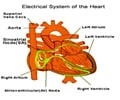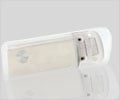Frequently Asked Questions
1. Which doctor administers a Holter monitor test?A cardiologist administers a Holter monitor test in an outpatient procedure.
2. What is a conduction block?
Electric impulses pass through the heart through specialized tissue referred to as the conduction system. A conduction block is a condition where there is a failure of the passage of electrical impulses through the conduction system. This can be detected with a Holter monitor.
3. What are the other devices besides a Holter monitor that can be used to monitor the electrical activity of the heart?
Continuous loop recorders, real-time continuous event recorders, implantable loop recorders (ILR), and non-looping recorders are other devices that can monitor the electrical activity of the heart.
4. Is a portable electrocardiogram (ECG) the same as an ambulatory ECG (Holter monitor)?
No, they differ in purpose.
- Portable ECG: Short-term device for immediate assessments.
- Ambulatory ECG (Holter Monitor): Long-term device for continuous monitoring over 24-48 hours to capture intermittent cardiac events.
It serves to continuously record the electrical activity of the heart over an extended period, typically 24 to 48 hours. It is used to understand and diagnose conditions such as arrhythmias, palpitations, fatigue, fainting, and dizziness.
6. What is Holter monitoring interpretation?
Interpretation involves analyzing the recorded data, comparing irregular heart activity with symptoms noted in a patient's diary. This aids in identifying patterns and irregularities in the heart rhythm, helping healthcare providers make informed diagnostic decisions.
7. Can Holter monitoring be done in real-time?
Yes, there are Holter monitoring real-time options available. Continuous monitoring allows for wireless, 24/7 access to data, enabling immediate detection of significant cardiac events and reducing the waiting time for medical intervention.
8. Is sleeping with a Holter monitor common?
Yes, patients are typically instructed to wear the device continuously, including during sleep. This comprehensive recording helps capture heart activity across different daily activities, including periods of rest.
9. What are abnormal Holter monitor results?
Abnormal results may include irregular heart rhythms, instances of palpitations, or other cardiac anomalies. The interpretation of these results is crucial in diagnosing and addressing underlying cardiovascular issues.
10. Where is Holter monitoring lead placement?
The placement of leads for the device involves attaching adhesive electrodes to the chest. Patients may need to remove upper body accessories and, in some cases, shave the chest for optimal electrode adhesion.
11. How does Holter monitoring impact blood flow?
It does not directly impact blood flow. Its focus is on recording the heart's electrical activity. However, by providing insights into the heart's rhythm, it indirectly contributes to understanding overall cardiovascular health.












